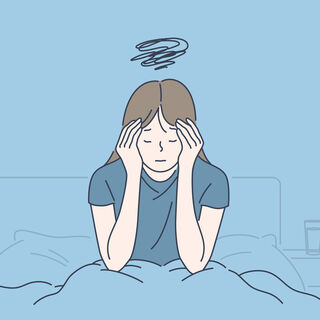Anxiety
Intolerance of Uncertainty and the Curse of Worrying
Pathological worriers often develop a psychological aversion to uncertainty
Posted October 15, 2021 Reviewed by Tyler Woods
Key points
- Intolerance of uncertainty is a state of distress caused by an inability to tolerate uncertainty.
- Intolerance of uncertainty is highly associated with pathological worrying.
- Intolerance of uncertainty has been found to be associated with a number of common mental health problems.
- Individuals with a diagnosis of autism often exhibit high levels of intolerance of uncertainty.
One of my grandmother’s favorite sayings was, “There’s only one thing that’s certain in life, and that’s uncertainty.” So, do we accept uncertainty as something we have to tolerate in life? Many of us do not. If you’re a chronic or a catastrophic worrier, you’re not going to let something as disruptive as uncertainty get in your way, you’re going to spend much of your time fruitlessly worrying about how to obtain that unobtainable state of certainty, and create a whole new set of worries along the way.

Those of us who are pathological worriers often develop a psychological aversion to uncertainty, yet there will always be an element of uncertainty in every worry that plagues us. This is a state that psychologists call “intolerance of uncertainty,” and it’s a trait that is highly associated with pathological and catastrophic worrying. It’s a state that is also a primary feature of Generalized Anxiety Disorder—the anxiety disorder whose cardinal characteristic is distressing, uncontrollable worrying[1]. Intolerance of uncertainty has been compared to an allergic reaction. Dan Grupe at the University of Wisconsin-Madison explains it like this, “If you’re allergic to nuts, and you have a piece of birthday cake that has a drop of almonds in it, you have a violent physical reaction to it. A small amount of a substance that’s not harmful to most people provokes a violent reaction in you. Intolerance of uncertainty is like a psychological allergy.”[2] When someone who is intolerant of uncertainty is exposed to just a little bit of uncertainty, they will have a disproportionally strong reaction to it. Not only will that cause worrying, it will also result in a strong emotional reaction creating stress and anxiety.
If a state of 100 percent certainty is impossible to achieve, then where does this leave the worrier who’s intolerant of uncertainty? Well, it probably leaves them locked in a cycle of endless worrying that’s psychologically impossible to terminate. Being dissatisfied with uncertainty will give rise to the worrier’s classic, “What if …?” questioning in a vain attempt to close that gap in the circle left by uncertainty. In the process, this will generate many more hypothetical worries mostly about things that will never happen. This is how worrying begins to feel uncontrollable, and this is yet another factor that makes worry seem like it just cannot be switched off.
How do those who are intolerant of uncertainty get out of this vicious worry cycle? They don’t just stop worrying, because worry for them doesn’t have an “off” switch. Instead, they employ a number of different strategies that either distract them from their worry or very cleverly diffuse responsibility for the worry. But these strategies don’t resolve the worry, they simply lessen the distressing levels of anxiety caused by uncertainty. For example, some people protect themselves from uncertainty by keeping themselves as busy as possible, thus limiting the uncertainty they might be exposed to. Others may distract themselves from their worry or simply procrastinate. If you procrastinate and decide not to do something, you don’t have to feel uncertain about it. But the canniest strategy is to diffuse responsibility by getting someone else to make a decision about the uncertainty. In its most common form, this is excessive reassurance-seeking—asking someone else their opinion on a decision you find difficult to make because you can’t resolve the uncertainty associated with the decision. “Should I take an umbrella out with me today?” you ask your partner. “No,” your partner replies. But you can’t stop yourself, then saying, “Are you sure?” You’re just double-checking that the response is reliable. The individual who is intolerant of uncertainty has a lot to gain from this strategy. It reduces the anxiety caused by the uncertainty, and it also removes the responsibility for the decision. But you can bet your life that if it ends up raining, the worrier in this cameo will end up blaming their partner for making the wrong decision. Your partner won’t be happy.
It’s clear that intolerance of uncertainty is a major factor in making worry seem uncontrollable and unstoppable, and simply trying to worry uncertainty away is an unachievable task. Because it’s impossible to get rid of all uncertainty in your life, you eventually have to learn to live with it.
This now raises the question of how some people become intolerant of uncertainty. We don’t know how for sure, but one group of individuals who do exhibit a raised intolerance of uncertainty are those with a diagnosis of autistic spectrum disorder, and there is evidence to suggest that relatively high levels of anxiety and worrying in autistic individuals may be caused in part by their elevated intolerance of uncertainty[3]. It’s speculated that intolerance of uncertainty in this group may be a result of some of the core characteristics of autism, such as insistence on sameness, inflexible adherence to routines, and difficulty tolerating change[4]. Sensory processing differences and difficulties understanding one’s own emotions make the world more uncertain and unpredictable for autistic individuals—an uncertainty which can become an aversive state fuelling anxiety and chronic worrying.
However, while individuals with a diagnosis of autism often exhibit high levels of intolerance of uncertainty, they are certainly not the only people who develop this aversion to uncertainty. Most recently, intolerance of uncertainty has been recognized as a risk factor not only for pathological worrying, but for many other mental health problems, such as anxiety, depression, obsessive-compulsive disorders, generalized anxiety disorder, and eating disorders[5]. Its reach appears to be truly transdiagnostic, and intolerance of uncertainty may turn out to be lurking in the background of many common mental health problems.
References
[1] Boswell JF, Thompson-Hollands J, Farchione TJ & Barlow DH (2013) Intolerance of uncertainty: A common factor in the treatment of emotional disorders. Journal of Clinical Psychology, 69, doi: 10.1002/jclp.21965.
[2] https://www.theatlantic.com/health/archive/2015/03/how-uncertainty-fuel…
[3] Jenkinson R, Milne E & Thompson A (2020) The relationship between intolerance of uncertainty and anxiety in autism: A systematic literature review and meta-analysis. Autism, 24, 1933-1944.
[4] Joyce C, Honey E, Leekam SR, Barrett SL, Rodgers J. (2017) Anxiety, intolerance of uncertainty and restricted and repetitive behaviour: insights directly from young people with ASD. J Autism Dev Disord. 47(12):3789–802.
[5] Carleton, R. N., Mulvogue, M. K., Thibodeau, M. A., McCabe, R. E., Antony, M. M., Asmundson, G. J. (2012). Increasingly certain about uncertainty: intolerance of uncertainty across anxiety and depression. Journal of Anxiety Disorders, 26(3), 468–79.


